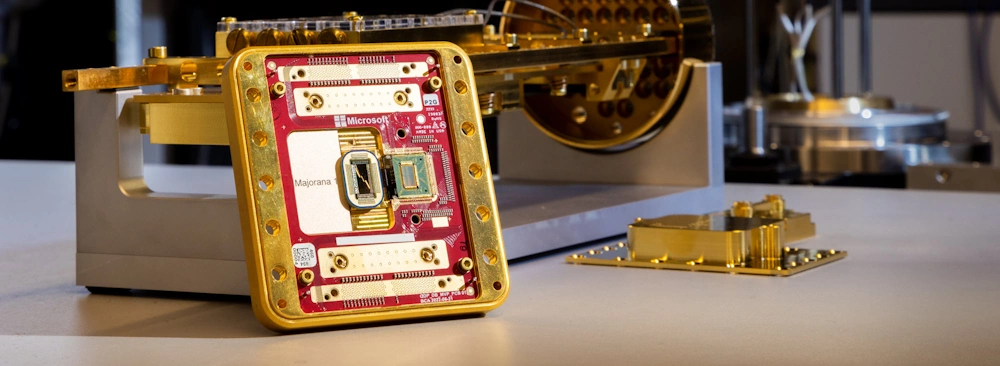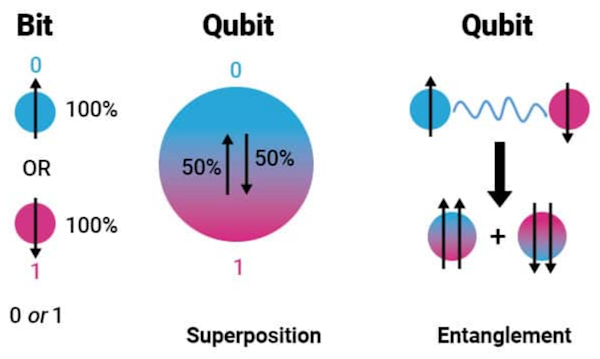 Quantum AI
Quantum AI
A new technology is emerging that promises to reshape our world
This technology is Quantum AI, a powerful combination of Quantum Computing and Artificial Intelligence
It's a field that's generating much excitement, for Quantum AI has the potential to solve complex problems at speeds that makes even our most advanced computers look slow.
 What is Quantum AI?
What is Quantum AI?
Quantum AI applies the principles of quantum mechanics to process information in ways that classical computers simply cannot. While traditional computers use bits that can be either 0 or 1, quantum computers use quantum bits or qubits, which can exist in multiple states simultaneously thanks to a phenomenon called superposition. This allows quantum computers to perform certain calculations exponentially faster than classical computers. The von Neumann architecture, which stores both program instructions and data in the same memory, has dominated traditional computing systems since the beginning of computers. We'll explain how this works.

Imagine combining this computational power with the pattern recognition and learning capabilities of artificial intelligence. It provides the ability to analyze vast amounts of data, recognize complex patterns, and make predictions with a level of accuracy and speed that was previously unavailable.
This exciting new technology is becoming increasingly accessible
Tech copanies like Microsoft, Amazon, Google, and IBM are now offering Quantum Computing (QC) as a service, allowing businesses and researchers to use the power of QC without having to build and maintain their own quantum hardware.
 Microsoft Majorana
Microsoft Majorana
On February 19, 2025, Microsoft introduced Majorana 1, the world's first quantum chip powered by a new Topological Core architecture that it expects will realize quantum computers capable of solving meaningful, industrial-scale problems in years, not decades. It leverages the world's first topoconductor, a breakthrough type of material which can observe and control Majorana particles to produce more reliable and scalable qubits, which are the building blocks for quantum computers.

Learn More: Introducing Microsoft Majorana 1
Microsoft unveils Majorana 1, the world's first quantum processor powered by topological qubits
 Quantum AI Deep Dive
Quantum AI Deep Dive
Quantum AI refers to the integration of Quantum Computing principles into AI
At the heart of QC are quantum bits, or qubits. Unlike classical bits, which can exist in a state of either 0 or 1, qubits can inhabit multiple states simultaneously due to a phenomenon known as superposition. This unique capability allows qubits to perform complex calculations at unprecedented speeds, effectively enabling quantum computers to explore numerous possibilities concurrently. For example, a system of two qubits can represent four different states at once (00, 01, 10, and 11), showcasing the exponential growth of information that can be processed as more qubits are added.
Superposition is a foundational principle of quantum mechanics that allows qubits to exist in multiple states at the same time. This capability enables quantum computers to execute various computations simultaneously, significantly enhancing their efficiency and power compared to classical systems. The potential of superposition in quantum computing opens new avenues for solving complex problems that are currently infeasible for classical computers.

Another key phenomenon is entanglement, where pairs or groups of qubits become interlinked in such a manner that the state of one qubit is dependent on the state of another, regardless of the distance between them. This intrinsic correlation enhances the computational power of quantum systems, allowing quantum algorithms to perform tasks such as factorization and searching more efficiently than their classical counterparts. For instance, entanglement is crucial for algorithms like Shor's algorithm, which can factor large integers exponentially faster than the best-known classical algorithms.
 Applications of Quantum AI
Applications of Quantum AI
The potential applications of Quantum AI are numerous and far-reaching. Here are a few examples:
Here are some more examples:
- Climate modeling could benefit from Quantum AI, allowing the creation of more accurate predictions of climate change and its effects.
- Quantum AI could revolutionize optimization in areas like logistics, finance (portfolio optimization), and drug discovery by finding solutions to problems that are currently intractable due to computational complexity. By optimizing complex processes, such as path planning in multi-robot operations, quantum computing could lead to significant productivity gains,
- Quantum AI can simulate quantum systems more naturally, which is beneficial for chemistry, material science, and physics, which could lead to better drug design or understanding of molecular interactions.
- In energy, it could accelerate the development of new, more efficient renewable energy technologies.
- Quantum AI could be used to develop new cryptographic methods or break existing ones, depending on the application.
 Research Initiatives and Collaborations
Research Initiatives and Collaborations
Quantum AI has spurred a number of research initiatives and collaborative efforts
These research initiatives and collaborative efforts aimed at unlocking the potential of quantum AI are characterized by partnerships among academic institutions, industry leaders, and government entities, all of which are vital for driving innovation and addressing complex challenges.
Collaboration between diverse fields is essential for the effective integration of quantum computing and AI. Quantum physicists, computer scientists, and AI researchers are joining forces to explore the complexities and opportunities within this hybrid domain. Institutions like MIT, Stanford, and the University of Cambridge are leading research in quantum AI, developing new algorithms and enhancing quantum hardware to facilitate novel applications.
Various countries and organizations are investing heavily in quantum computing research. For instance, the partnership between Google Quantum AI and institutions like the University of Chicago and the University of Tokyo exemplifies a substantial commitment to advancing quantum computing capabilities. This collaboration is aimed at developing a fault-tolerant quantum computer and enhancing entrepreneurship in the quantum sector, with an investment of up to $100 million over ten years. Japan is also emerging as a significant hub for quantum research, with the University of Tokyo conducting studies that explore scalable quantum computing technologies. Such international collaborations are crucial for sharing resources and insights, thereby accelerating the development of quantum AI solutions.
As research in quantum AI progresses, ethical considerations and responsible innovation must be at the forefront. Collaborative initiatives promote equitable access to quantum technologies and address global challenges collectively, ensuring that advancements benefit society as a whole. The formation of networks, such as newsletters and workshops, helps sustain active relationships among researchers and promotes the dissemination of knowledge in the quantum AI community.
To support the next generation of quantum AI leaders, investing in education and training is critical. Numerous programs are aimed at funding graduate and undergraduate research in this emerging field, nurturing talent that will shape the future of quantum computing and AI. Furthermore, fostering interdisciplinary collaboration not only enhances the understanding of complex quantum systems but also catalyzes innovative breakthroughs in areas like machine learning and data processing.
Through these concerted efforts, the synergy between quantum computing and AI continues to evolve, promising transformative impacts across various sectors and disciplines.
 Challenges and Limitations
Challenges and Limitations
Quantum AI faces several challenges that must be addressed to harness its full potential
These challenges include issues related to hardware, error correction, scalability, and the integration of quantum and classical algorithms.
Quantum Hardware Limitations
One of the most significant challenges in quantum computing is the limitations of current quantum hardware. Current quantum computers are noisy, limited in qubit count, and require extremely low temperatures, making them impractical for widespread use. Qubit calibration, a critical process for ensuring the correct functioning of quantum computers, is time-consuming and complex due to the sensitive nature of qubits to their environment. The fabrication of quantum devices does not yet match the consistency of classical hardware, making it difficult to achieve reliable qubit performance over time. Also, the resources required for quantum research and development are substantial, necessitating significant financial investment and technological innovation.
Error Correction Challenges
Quantum states are fragile, so maintaining coherence and correcting errors is a significant challenge. Decoherence is a major hurdle for quantum computing, as interactions with the external environment can cause qubits to lose their quantum behavior, leading to errors in computations. Unlike classical error correction, which addresses straightforward bit flips, quantum error correction must account for both bit and phase flips due to the complex nature of quantum states. This necessitates the development of efficient error correction codes, such as the Shor code, which encodes a single qubit into multiple qubits to protect against arbitrary errors. The challenge is further compounded by the need for fault tolerance, ensuring that computations remain reliable even when some qubits fail or experience errors.
Scalability Concerns
Scalability remains a critical concern as the size of problems addressed by quantum computing grows. Current algorithms and systems struggle to scale efficiently, especially when considering large-scale applications in fields like cryptography and optimization. The von Neumann architecture, which underpins classical computing, limits classical algorithms' ability to process complex problems efficiently. Consequently, as input size increases, the computational resources required to solve these problems grow exponentially, posing significant challenges for both classical and quantum systems.
Integration of Quantum and Classical Algorithms
To maximize the capabilities of quantum computing in AI, there is a pressing need for the development of hybrid quantum-classical algorithms. These algorithms must be designed to leverage the strengths of both quantum and classical computing to solve complex problems effectively. The integration of these two approaches remains a work in progress, with ongoing research focused on overcoming the barriers that hinder their collaboration.
 Future Prospects
Future Prospects
Quantum AI is a promising frontier with the potential to transform technology
As quantum computing continues to develop, experts foresee significant advancements in the field within the next decade, particularly in achieving a quantum advantage over traditional computing systems for specific applications. This progress is expected to unlock unprecedented possibilities in AI, enabling breakthroughs that were once deemed unattainable.
Synergy Between AI and Quantum Computing
The integration of AI's efficiency and adaptability with quantum computing's transformative power is projected to foster innovative solutions in many areas, including healthcare and autonomous systems. The growing synergy between these fields has generated optimism for revolutionary advancements in computational capabilities, as evidenced by ongoing collaborations between academia and industry aimed at harnessing this technology.
Industry Developments and Future Opportunities
Looking ahead, industry leaders are enthusiastic about the prospects for quantum AI, noting that this convergence will redefine technological capabilities and create new opportunities to address complex problems. Significant milestones have recently been achieved in quantum computing, with expectations for continued progress that will enhance our understanding of quantum technologies. As government initiatives, such as the CHIPS and Science Act in the USA, begin to impact quantum computing, the potential for foundational research and development will increase, paving the way for more innovation.
 Links
Links
vivatechnology.com/news/quantum-ai-definitions-and-use-cases
research.aimultiple.com/quantum-ai
pasqal.com/news/quantum-ai-explained-the-essential-guide-for-business-leaders-ready-to-innovate
pragmaticcoders.com/blog/what-is-quantum-ai
signitysolutions.com/tech-insights/what-is-quantum-ai
en.wikipedia.org/wiki/Quantum_artificial_intelligence